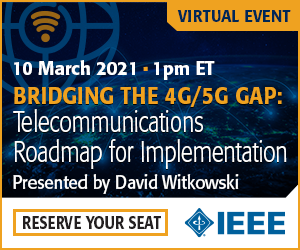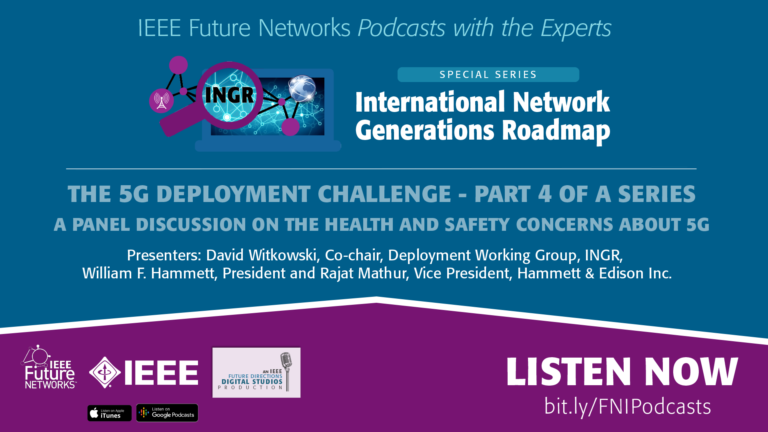
Bridging the 4G/5G Gap: Telecommunications Roadmap for Implementation
Wireless technologies have become a fundamental part of daily life in the 21st century. They give us the ability to make efficient use of our time, connect us any time and anywhere, and make our lives better in innumerable ways. In order to function, wireless devices need to connect to cellular sites that provide good coverage both outdoors and indoors. To do that increasingly requires placement of sites closer to populated areas–creating new challenges for both the wireless industry and local governments. Next-generation cellular technologies will enable greater functionality, but their complexity places increasing burdens on municipalities and government agencies–including a need to understand the relevant technical terminologies that appear in applications, permitting and licensing negotiations, and deployment planning.
Join IEEE Educational Activities and the IEEE Future Networks Initiative for this two-part series to learn from subject matter expert David Witkowski. Save 30% by purchasing both virtual courses!*

Part One
Virtual Course: Currently Available
Duration: 2 hours
Key Objectives:
- Provide a historical overview of 4G/5G technology and how it has impacted society and residents of the United States
- Explain the legislative and regulatory background that defines what local governments, agencies, and the wireless industry can and cannot do

Part Two
Date: Wednesday, 9 June 2021 at 1pm ET
Duration: 2 hours
Key Objectives:
- Showcase the scientific evidence surrounding wireless facilities’ impact on property value and human health, as well as address related 5G conspiracy theories
- Provide a roadmap to deploy wireless facilities while minimizing the risk of legal actions either by wireless industry or private citizens
More About This Two-Part Series
This two-part series is brought to you by IEEE in partnership with IEEE Educational Activities and the IEEE Future Networks Initiative. IEEE is the world’s largest technical professional organization dedicated to advancing technology for the benefit of humanity. IEEE delivers peer-reviewed education on cutting-edge technologies, brought to you by leading experts.
Who Should Attend:
- - Technical professionals working in ICT and the telecommunications industry
- - Academic faculty members teaching about cellular technologies
- - Students interested in learning about the applications of cellular technologies on a local level
- - Institutions, corporations, and organizations that work on cellular-related topics and projects
- - Local government and municipal agency leaders including:
- - Elected officials (mayors, council members, etc.)
- - City/town managers and assistant/deputy managers
- - Public works, transportation, and public utilities employees (directors, managers, and engineers)
- - Planning staff and planning commissions
- - Economic development (directors and managers) and hospitality/visitor agencies
- - Municipal real estate employees (directors, managers, and staff)
- - Local businesses, social service clubs, Chamber of Commerce leaders and staff
Benefits of Attending:
- - After completing an assessment at the end of each course, attendees will earn a Certificate of Completion confirming 2 PDHs/0.2 CEUs per event OR 4 PDHs/0.4 CEUs for both courses
- - Attendees of both events will receive an IEEE digital badge that may be shared on social media channels
- - Access to resources related to the topic (i.e. Bridging the Gap: 21st Century Wireless Communications Handbook, 2019 Edition)
- - Access to the on-demand version of each course for one year from the date of the live airing, with unlimited amount of views
Pricing
Registration for One Virtual Course
IEEE Members: US$39
IEEE Student Members: US$29
Non-members: US$59
Registration for Both Virtual Courses
IEEE Members: US$59
IEEE Student Members: US$49
Non-members: US$79
*You must register for both courses together in order to receive the 30% discount.
Discounts will not be applied retroactively.

Presenter Bio:
David Witkowski
David Witkowski is an author, advisor, and strategist who works at the intersection between wireless telecommunications and local/regional governments. After serving in the U.S. Coast Guard and earning his B.Sc. in Electrical Engineering from the University of California, he held managerial and leadership roles for companies ranging from Fortune 500 multi-nationals to early-stage startups. David is the Founder & CEO of Oku Solutions LLC and serves as the Executive Director of Civic Technology Initiatives at Joint Venture Silicon Valley. He also serves as Co-Chair of the Deployment Working Group at IEEE Future Networks, Co-Chair of the GCTC Wireless SuperCluster at NIST, on the Board of Expert Advisors for the California Emerging Technology Fund, and is a Fellow in the Radio Club of America and a Senior Member in the IEEE.
More Resources
The 5G Deployment Challenge
Check out this podcast series from the IEEE Future Networks Initiative.
5G promises to usher in a new era of connectivity and productivity, but is it safe? Misconceptions about the health impacts of 5G abound, even some that imply the technology is associated with the COVID-19 pandemic.
Episode 4 of the series brings together a panel of industry and technology experts including David Witkowski of the IEEE Future Networks Initiative, and William F. Hammett and Rajat Mathur of Hammett & Edison. Panelists offer an in-depth exploration of 5G-related health concerns, and apply a scientific perspective to the question of electromagnetic safety of cell towers and wireless installations.
